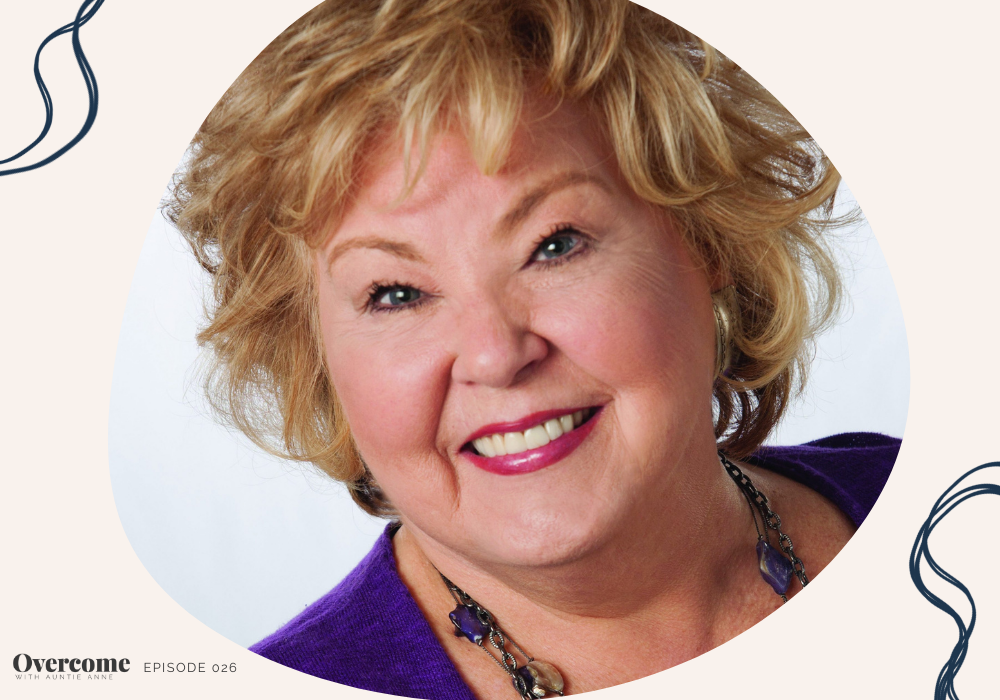Gloria Gaither is a gospel music legend. She and her husband, Bill, have written more than 700 songs, and they’ve created hundreds of award-winning recordings and a dozen timeless musicals that have been sung for decades. And even though they were named ASCAP’s Christian songwriters of the century in 2000, Gloria has had her struggles with communication with God.
This week on Overcome With Auntie Anne, I’m talking with Gloria about prayer, the struggles she’s experienced with it, and how she eventually realized God was communicating with her all along. It’s a story that many of us can relate to, and I know you’ll find it encouraging and inspiring.
Listen to the podcast to hear our entire conversation. Or keep reading below for some of the highlights.
Not talking to God
Amidst all the accolades that Gloria has received in the gospel music scene — including Grammy awards, Dove awards, and induction in the Gospel Music Hall of Fame — she’s also written and published over 40 books.
One of her books is called A Book Of Simple Prayers, and it’s the focus of our conversation today.
I love this book. I have a copy of it with my devotionals, and I keep returning to it. I see new things because these prayers of Gloria’s are inspirational.
And reading them has made me wonder about the role of prayer in overcoming a problem, a trauma, a death, or whatever it is you may be experiencing. Does overcoming start with prayer?
For Gloria, this book was never something she wanted to put out into the world. It was too personal. And the reasons these prayers came about might surprise you.
It was during a time of life when Gloria says, “I hadn’t lost my faith, but I was not talking to God. So I was not praying.” She was in the process of doing other work, other writing projects, and whatnot, but during that other work, she just wasn’t in communication with God. “I didn’t know what to say to him. It wasn’t that I didn’t believe in him anymore,” she says, “[but] I wasn’t talking to him.”
Something interesting started happening, though. When Gloria writes, she likes the “ambiance of people talking around [her].” So she would often be out in public working. But while there, she’d get distracted by simple things, like “a merry-go-round carousel that they’d put up in the middle of the mall,” or “the seagulls and how they fed” while on vacation at the beach.
To clear her mind from the distraction, Gloria would pull out a little journal she kept with her and write to “respond to this interruption and … get it out of [her] consciousness.” She did this for months when she wasn’t praying and wasn’t regularly communicating with God.
However, Gloria realized that even though she wasn’t talking to God during this time, he was talking to her. So these little interruptions that Gloria was experiencing — interruptions that she wrote about so she could then focus on her work — were actually God communicating to her.
She says that God isn’t “discouraged by our lack of attention.” He keeps pursuing us, keeps trying to get our attention. He’s so intent on us as his creation that he’ll keep trying to get to us, even with, like in Gloria’s case, little “distractions.”
Eventually, Gloria realized that her responses were written to someone. “I was talking to somebody,” she says, “and I was talking to somebody in response to an interruption.”
What she realized is that these responses were prayers. “When I flipped back and started reading these,” she says, “it occurred to me that it was actually a prayer, but it was a prayer in answer to God.”
Many of us have been there
Some of you might be surprised to hear that someone like Gloria Gaither went through a period where she wasn’t talking with God. But I think if we’re honest with ourselves, many of us experience something similar at some point in our lives. I know I have.
I remember telling Jonas one time when it seemed like everything was falling apart around me, “This God thing just isn’t working for me, and I can’t pray anymore.” For three years, I literally couldn’t pray audibly to God because when I tried, I got this lump in my throat, and it felt like it was going to choke me.
Gloria’s publisher also recognized this as something others experienced. As I said above, Gloria felt the things in this book were too personal to publish. But her publisher asked her to see it anyway.
And after looking at it, the publisher got back to her, and Gloria recalls what the publisher said: “She said it in nicer words, but I’m gonna say what she really meant. She said, ‘Don’t you think it’s a little arrogant of you to think that you’re the only person who has issues with God.’ And I said, ‘Wow … maybe it is.’ She [the publisher] said, ‘I think this is right where a lot of us are. Please let me publish them.'”
And this is why I find this book so inspirational. Because like I said before, I wonder if prayer is the beginning of overcoming. If we believe God loves us, we can believe God is still working to get our attention. And though we may not notice it, we’re responding in whatever way we know how.
Like Gloria, some of us may not think we’re actually praying in the traditional sense. But maybe with our responses, we’re praying anyway. Regarding her experience, Gloria says, “As you read through the book, you’ll see that I prayed myself out of not talking to God into actually talking to him again.”
And honestly, maybe it’s not trauma or terrible experience that keeps you from praying, but everyday life. So many of us are just busy — with family life and work, with bills and meetings, with getting the kids off to school and then chauffeuring them around to different activities, with making dinner and doing laundry — that we don’t feel we have time to pray.
Or we think prayer needs to be done a certain way — in the right position or the right frame of mind. But God is not in a box waiting for us to sit down and fold our arms in prayer or do whatever the rituals are that we’ve been taught. God will talk to you anywhere, anytime. And you can hear him clearly. As Gloria says, prayer is “mostly shut up and listen.”
Let’s “shut up and listen”
So in light of that, I’d like to share a prayer from Gloria’s book. And I invite you to listen as you read.
Thank you, Lord, for this rare week of listening. Thank you too that you don’t require silence and solitude before you speak to me because these are not regular commodities in my life. Often in my noisiest places, I feel you turning my face towards you like a child does when she needs someone to pay attention. You turned my face to you with a sunset, a song, a majestic storm, or a small child’s giggle. Sometimes in a crowded place, you whisper in my ear direction, warning, advice, or sweet endearments for no other reason than I need so to hear them. But this week, Lord, you have given me a quiet space away from other voices. Here I have not felt guilty for choosing solitude. I have been comfortable with the silence. There have been no Mount Sinai revelation. I only sense a turning in my spirit. I keep remembering the haunting words, “He set his face toward Jerusalem.” What I’ve seen is less a call to action and more a setting my face toward. Thank you. (A Book of Simple Prayers, Page 57)
Gloria says, “I think it’s important that … we understand that there’s no place we can go that we can leave his presence.”
I started by asking if prayer is the beginning of overcoming our obstacles, and I must say, I believe it is. But often, that “prayer” may simply be sitting, listening, and experiencing God’s presence. If we can allow ourselves to do that, he will never let us down. And he will always be right there with us.
If you’d like to learn more about Gloria and read her writings, visit her blog lovesongsofmylife.com. You can also find other books of hers on Amazon.






